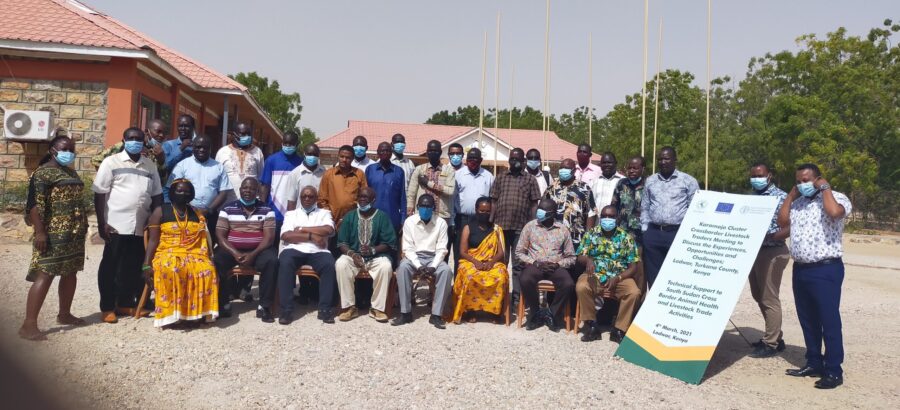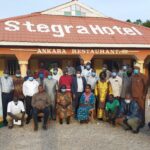Background
Cross-border trade in livestock and livestock products between South Sudan and neighbouring countries is both formal and informal. Informal trade is dominant in the cluster due to the porous borders and lack of awareness among the livestock traders of formal cross-border trade. Majority of traders evade taxation yet under the East African Community Customs Management Act 2004, EAC common external tariff 2017 and EAC VAT Act, livestock export to any EAC country, in this case Kenya, South Sudan and Uganda is tax-free.
However, most of the markets in pastoral and agro-pastoral areas are mostly traditional, inefficient and characterized by poor marketing conditions. Trade informality, poor market infrastructure, poor animal disease management, poor market information flow, poor negotiation skills, risk from trust-based transactions, and confiscation of livestock during conflict are among the common problems experienced by the market actors. In addition, associated defaults (faced mainly by the small and poor livestock keepers), are common in the livestock marketing system in such areas. In the extreme cases in remote areas, poor or lack of infrastructure, coupled with insufficient number of traders leads to absolute absence of effective livestock market. For example, there is low or no demand for animals and animal products, strong competition and also liquidity problem in some hard to access cross-border areas of Karamoja cluster. In this case, livestock keepers are obliged to engage in barter trade transactions, exchanging live animals for other products and commodities which contributes to exploitation. The objective of the one-day meeting, held on 4th March 2021, was to discuss the experiences, opportunities and challenges in the Karamoja cluster.
Opening Remarks
The meeting was officially opened by Bishar Elmi, the Director of Livestock Production, Ministry of Agriculture, Livestock, Fisheries and Cooperatives. Welcome remarks were made by Dr. S. J. Muchina Munyua, Director of IGAD Centre for Pastoral Areas and Livestock Development (ICPALD). They informed participants that cross-border pastoral areas are endowed with huge livestock resources that are essential for sustainable livelihood earning if free trade is promoted. Taxation used to be a challenge but this has been zero rated between EAC Member States. The initial challenge was determining which point a pastoralist is to attract tax when selling livestock for trade or livelihood. Moreover, there is still the need to regulate how pastoralists acquire and dispose their livestock as they search for water and pasture during migration, since some are born along the way while others are sold to purchase staple food commodities for herders. Barter trade is what thrives in cross-border communities since financial institutions and liquid monetary cash may be hard to come by. This requires streamlining to minimize exploitation of pastoralists by unscrupulous traders. It can be done by developing basic infrastructures such as livestock markets in these areas so as to regulate trade. This meeting sought to review any opportunities that can be tapped as well as challenges to be addressed to promote formal trade in the cross-border areas of Karamoja cluster. The meeting was attended by 44 representatives from the Ministries in charge of animal resources, trade and customs/ migration, chamber of commerce, traders from Ethiopia, Kenya, South Sudan & Uganda as well as ICPALD. The meeting deliberations were as follows:
On objectives and outputs of the workshop/ IGAD efforts that promote cross-border trade in livestock and their products in Karamoja cluster, IGAD region and beyond – ICPALD
Plenary discussion points
- The poor livestock production systems in the Karamoja cluster need to be improved through government extension services as well as support from development partners to promote fodder production, market linkages, disease management.
- Poor road network especially in Turkana West and Kapoeta contributes to high cost of commodities, violation of animal welfare during transportation as well as rampant insecurity that constrains smooth cross-border trade which requires improvement.
On the status of cross-border trade in livestock and staple grain, challenges and recommendations going forward – Ethiopia, Kenya, South Sudan and Uganda Ministries of Trade
Key plenary discussion points
- Livestock transportation for trade violates animal welfare requirements. One lorry with three tiers often carries cattle in lower deck, shoats in second deck while poultry on top deck that is not well designed. Crowding is often witnessed which contributes to bruises, and sometimes even death. This should be addressed by all the four countries.
- Country presentations focusing on what’s done in each country is good for Karamoja cluster to expose traders on how they can exploit the huge potential in their possession.
- Uganda has gold deposits from many parts of the country including Kasese, Kaabong but minimal mining is done. The country also gets gold from DRC, South Sudan, Southern Africa countries for refining, packaging and export to countries of high demand from around the world.
- Alcohol abuse in Karamoja cluster has rendered many youths unproductive. The most abused alcohol is hot spirits packed in less than 250 ml sachets. Kenya and Uganda initiated procedures to regulate this menace which requires good enforcement to realize gains.
- The threat to livestock forage brought about by desert locusts should be addressed at regional level if control measures are to succeed.
- Peace building in the cluster should be promoted through disarmament or regulated ownership of small arms like in Kenya through police reservists.
- Cattle rustling is costing countries huge billions of US dollars in addition to loss of lives. Role of LITS will be instrumental to mitigate the menace.
Recommendations
- Member States should promote commercial livestock production in pastoral areas to make it more sustainable and competitive.
- MS should promote value addition (live animals through feedlots, ranches; milk, meat and hides & skins) while conforming to import countries sanitary standards.
- MS and IGAD should improve cross-border investments in terms of livestock markets, water facilities, warehouses, slaughterhouses, quarantine stations etc.
- Customs and Revenue offices should gazette more cross-border points to enhance regulated trade.
- MS and IGAD should strengthen harmonized surveillance and management of TADs.
- MS and IGAD should strengthen peace dialogues in the cluster to promote trade.






